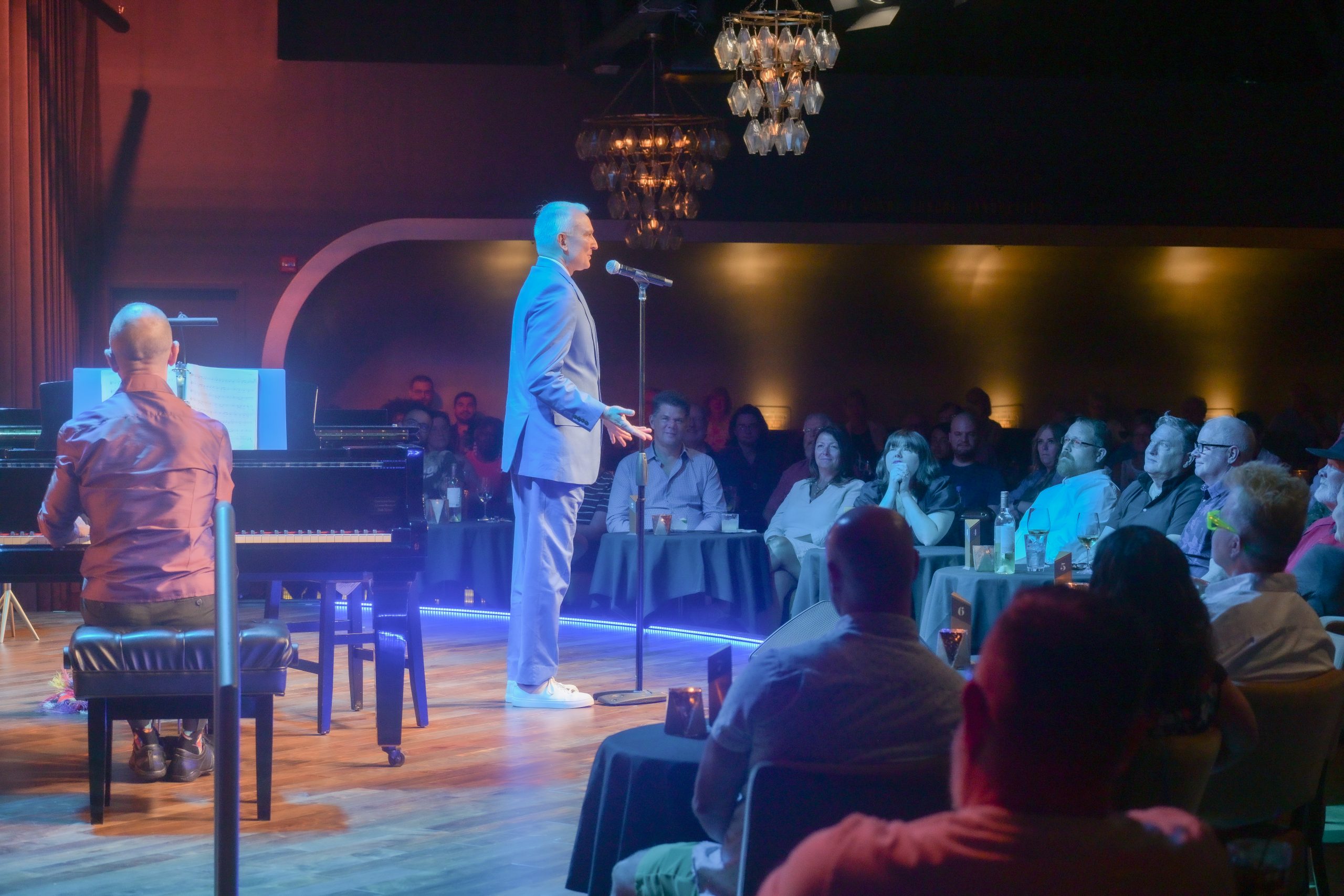
L-R Christopher Marlowe & Norman Lasiter – Courtesy of Mark A. Lee of Great Exposures. Used with permission.

L-R Christopher Marlowe & Norman Lasiter. Courtesy of Mark A. Lee of Great Exposures. Used with permission.
Capitalizing on the success of his 2022 IndyFringe cabaret production of “Gray Pride,” singer Norman Lasiter. 65, drew a sold-out audience to his expanded show of the same title Sunday at The Cabaret. The event was a benefit for the Damien Center. Accompanying him on piano was his music director and pianist Christopher Marlowe who flew in from his Palm Springs, California, home to play for his friend of twenty-five years.
I favorably reviewed Lasiter’s Fringe show in this column last August, so I knew what to expect. Nevertheless, my reaction to this version is similar. Artistically, the show was well-crafted, and solidly performed by Lasiter and Marlowe, the latter best known as the music director and arranger for the late, great cabaret star Nancy LaMott.
Sharing that he had once lost his voice for several years, Lasiter demonstrated that his formidable instrument had more than recovered, as he sang in an appealing baritone voice that was rich and full-bodied in texture and tone and reflected a versatile range and fine control.

L-R Christopher Marlowe & Norman Lasiter. Courtesy of Mark A. Lee of Great Exposures. Used with permission.
Projecting a campy stage personality that was charming and guileless, yet confident, Lasiter delighted his audience with stories and anecdotes about growing up in Central Indiana, his introduction to music by way of his high school band and coming out as gay. He also spoke fondly about doing cabaret shows with Marlowe and singing with the Gay Men’s Chorus in New York City where he resided and tragically experienced the loss of numerous friends to AIDS. He also recounted his move to Palm Springs prior to returning to the Indianapolis area seven years ago. A consistent theme during his banter was his experience with the aging process as a single gay man, and hence the show’s “Gray Pride” title.
Lasiter’s nostalgia inducing 75-minute show was superbly enhanced by Marlowe’s excellent arrangements and affecting performance. Lasiter opened strongly with a stirring medley of “Before the Parade Passes By/Don’t Rain on My Parade” from “Hello Dolly” (composer and lyricist Jerry Herman) and “Funny Girl” (composer Jule Styne and lyricist Bob Merrill). Highlights of his show included a medley by Irving Berlin of “I Love a Piano/A Simple Melody” with a solo by Marlowe that was a crowd favorite, a moving rendition of “Everything Possible” by composer Fred Small, a Burt Bacharach/Hal David medley of songs made famous by Dionne Warwick, “Marry Me a Little” by Stephen Sondheim, and “Never Never Land” from “Peter Pan.” Lasiter effectively closed with a very poignant interpretation of “Try to Remember,” the perfect summation of his relatable life story.

Norman Lasiter. Courtesy of Mark A. Lee of Great Exposures. Used with permission.
What impressed me most about Lasiter’s well-programmed show, much like what occurred at his Fringe show, was his undeniable connection with his audience, consisting of those who were obviously family and friends, based on their enthusiastic, affectionate, audible responses. Looking around at the primarily Boomer audience, however, I observed that most were transfixed with Lasiter and Marlowe’s engaging performance that combined effective storytelling with first-rate musicianship for an early evening of pure entertainment.





